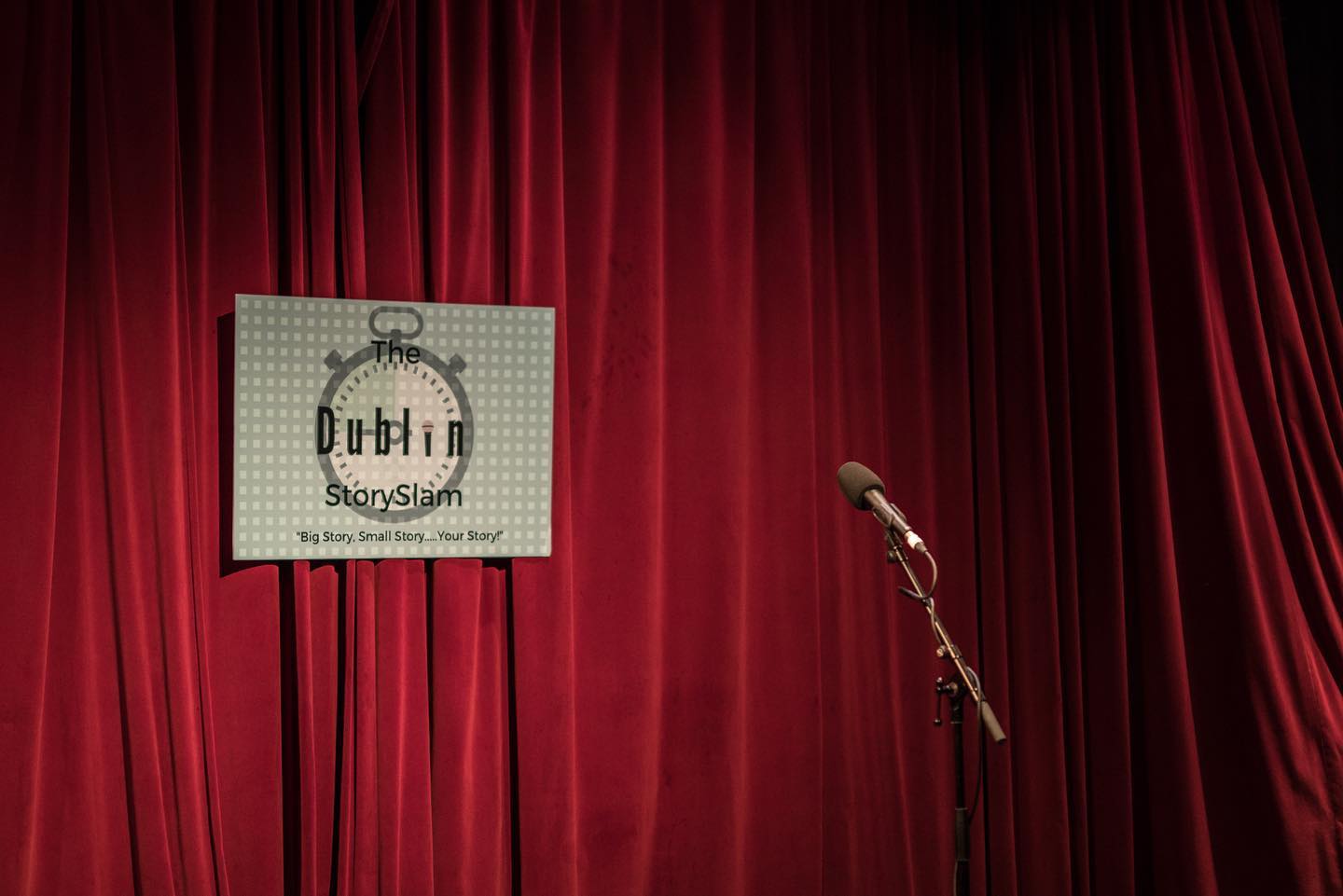For the new year of 2020, a common goal seemed to be attend more cultural events in the city, as the queue for this month’s Dublin Story Slam winded down Leeson Street. Starting as the Moth Story Slam, the Dublin Slam was created in 2017 as a local space to share and listen to stories. Every month a theme is announced online and once inside The Sugar Club, audience members can become performers by signing up to tell their tale. However, while many of the stories have clearly been previously honed and others completely spur of the moment spiels, these true anecdotes can’t be read from a script. Host and comedian Colm O’Regan emphasises the importance of keeping the performance to the oral tradition so listeners of the show’s eponymous podcast can fully share the experience. With the clinking of pint glasses in the bar at the back, the cosy red velvet lining of the venue, and the tables of chatting patrons, it feels like locals telling stories to their friends at the pub. Except now there’s a microphone — and requests from the radio producer to please hush the clinking.
January’s theme was Goals and tickets for the monthly show sold out within an hour. Three judging teams in the audience, tonight self-dubbed The Goal Shabang, Goal Post Moderns, and the Goal Diggers, score the tellers out of ten. Showrunner and producer Julien Clancy rings a series of ascending notes on his daughter’s toy xylophone (“which she’s kind of grown up without now,” quips O’Regan) to keep the storytellers within their allotted 4-7 minutes.
While the judges deliberate, O’Reagan reads out the goals and achievements audience members chose to share without the fright of the stage. There were multiple successful climbs of Croagh Patrick in various states of inebriation or dress. One impressively pulled off his intention of keeping his mother-in-law of two years unaware that he was a Protestant. Another celebrated getting out of America before Trump became president by any means necessary, including stripping — to which my neighbour turned and mouthed “is that you?”.
Peter King’s goal elicited a wave of “awww”s from the audience: to literally sweep his girlfriend off her feet when they were reunited from his Erasmus. And after working out in his campus gym in Shanghai enough, he accomplished it: “I picked her up and I’ve never let her go since. She’s now my wife.” Queue rapturous delight from the audience.
Another great “awww”-inducing moment was when in storyteller Natasha Halpin’s pursuit of getting over her fear of swimming, she had to reject her secondary school crush’s offer of a first date because he asked her to go for a swim.
Not all goals were met however. Will O’Connell paralleled his experience of going to London with the aim to become a father through co-parenting in 2019 with his mother’s experience of going alone and in secret to London to have a baby out of wedlock in 1973. By the end of his thoughtful, sweet story, his mother was able to push away the insisted upon adoption forms and his parents were able to able to bring him back to Ireland, where he “experienced love for the first time”. However, through a mistake in his background check, he had to return to Dublin without a child.
While these summaries may list the plot of the stories shared, they fail to convey what truly makes them wonderful: the art of the telling. The pauses for effect, the self-effacing sidenotes, the imagery, imitating accents and voices on a sliding scale of accuracy. One of my favourites of the night, Myriad Murphy, used all these devices and more. She began with a simple goal of communicating well as a nurse and with her witty self deprecations, throwing in a speedy “I got myself a boyfriend, a hairy Dublin variety sitting over there looking like Santa on holidays”, it ended with the crowd in stitches. The wonderful live dramatic irony of an audience being in the know while the teller relives being hopelessly unaware leads to hilarity in John Craddock’s story of cleaning his house’s window with tampons as a boy before knowing they had any use beyond a strangely-shaped sponge. Revelling in the chaos of Murphy’s Law, these stories show how some of the best stories come from things going very wrong.
The winner was Rose, whose story of adversity ending in triumph won over the judges with a combined score of 9.3. After a traumatic event leading to depression, her goal was to redeem her eventual failed leaving cert, which she described as “compounded shame”, by completing a Masters degree. After an initial success as a student again, she faced another terrifying setback: cancer. With the audience gripped in empathy for such a series of painful circumstances faced by such a kind, hopeful storyteller, the whole club cheered when her story ended victoriously in her achieving a 2:1 in her Masters, surviving her tumor, and getting engaged.
Waiting in the long expectant queue, I met Sean Kearns who has performed on the Dublin Story Slam stage before, and he said: “Initially you think you’re telling a story for other people, while actually it allows you to reflect on your life and the experiences that you’ve had. And storytelling is innate to being Irish. It is very much embedded in our culture. But in a modern world we don’t always curate a lot of time to do that. And somehow this night creates it for you. So it allows you to reflect on your life and tell a story… I recommend it to all.”
Tickets can be bought by signing up to the email list, available of their website. If you aren’t able to come across ticket, The Dublin Story Slam Podcast has curated episodes of the night’s stories released monthly.






